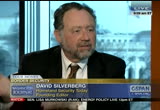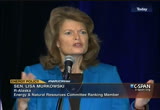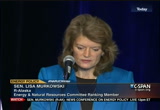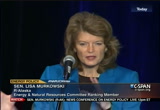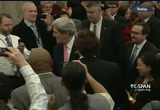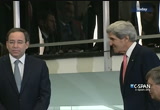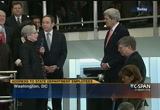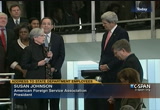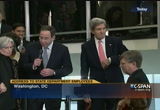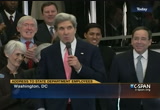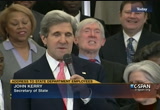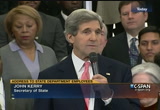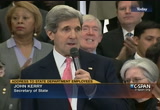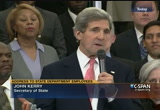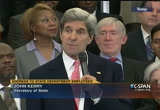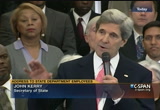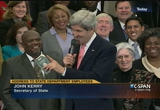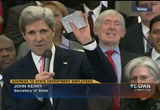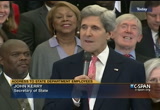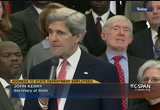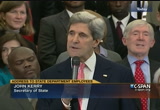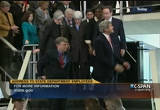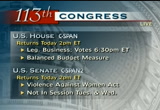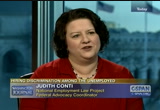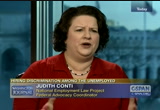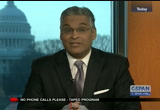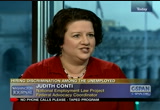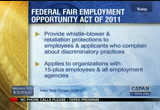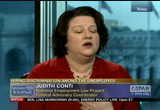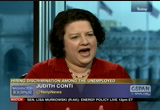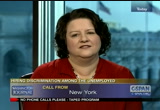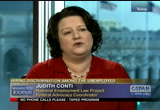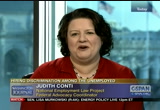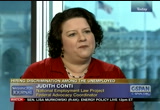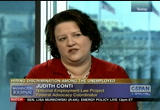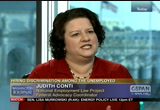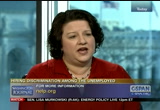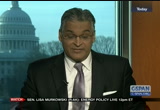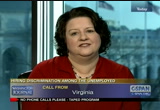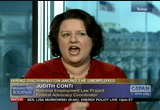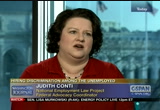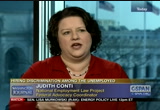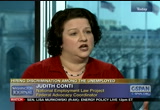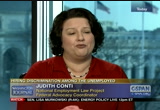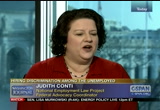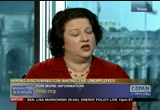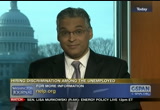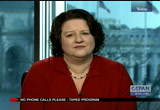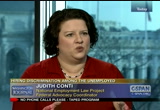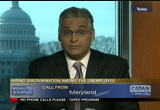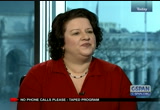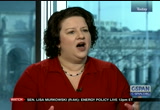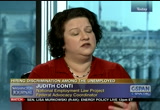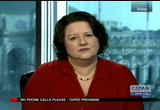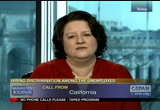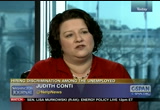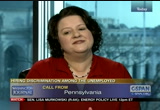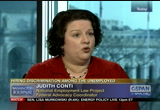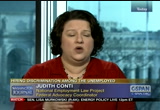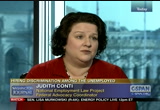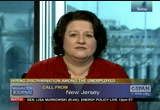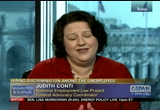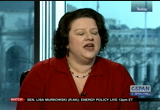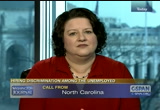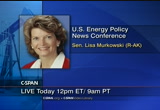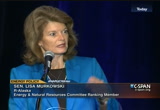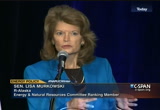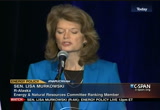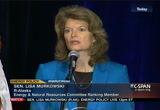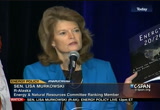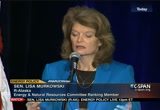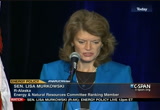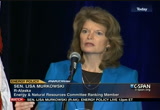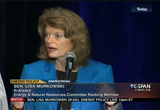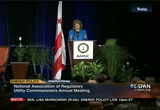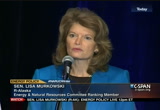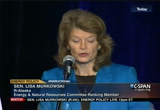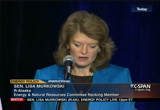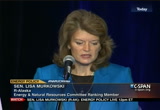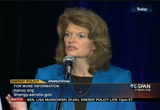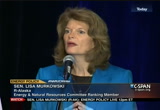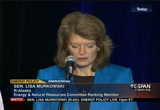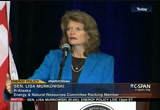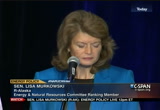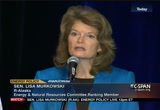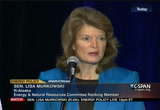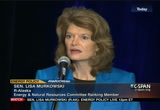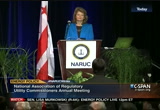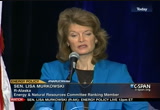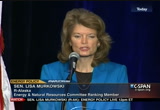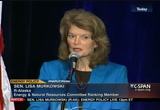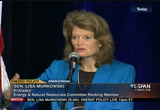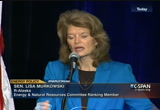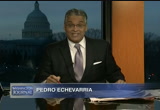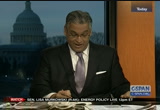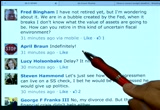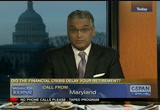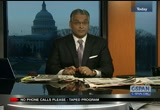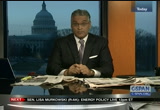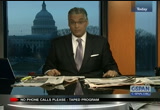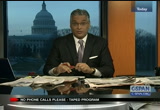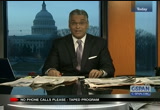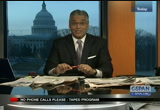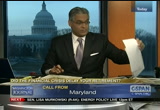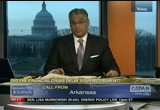tv Politics Public Policy Today CSPAN February 4, 2013 10:00am-12:00pm EST
10:00 am
personnel, or in resources to enforce the law of the land. you want the law enforced? you want the border secured? funded and make sure we have the resources. host: david silverberg, founder and editor of "homeland security today." thank you. that is it for "washington journal." we will see you then. c-spa [captioning performed by national captioning institute] [captions copyright national cable satellite corp. 2013] >> coming up today on c-span, lisa and rakowski from alaska, the ranking member of the natural resources committee will
10:01 am
hold a conference on capitol hill to talk about energy priorities. she will also take questions from reporters. she outlined her plan at the annual meeting of the national association of regulatory utility commissioners. here is a bit of what she had to said. >> in our report, we declare five principals in addition to energy -- i am trying to make this release symbol for everybody for the morning fog of monday. energy is good and then there are five principles. it is in our national interest to make energy abundant, affordable, colleen, diverse, and secure. i have even put them in alphabetical order for ease of memory. [laughter] no acronyms this morning, alphabetical is good. let's talk about abundance -- as a standard of living rises, demand will continue to rise and anyone who has experienced a black out, it is amazing how
10:02 am
this blackout last out -- last night ties into everything i have to say this morning. [laughter] anyone who has experienced a super bowl black out or a gasoline shortage does not need an explanation of the value of energy abundance. we should aim to use our energy more wisely but that is not a substitute for production or four measures that will increase the reliability of our systems and supplies. second, this notion of affordability -- the direct cost of energy affects the cost of everything. everything we do. there is nothing else that impact our economy so directly as energy. whether it is individuals that are struggling to fill up their gas tanks, pay their electric bills, whether it is business leaders making decisions on investments based on the cost of power server farms or smelters, we recognize lower cost is
10:03 am
better and that's what everybody is seeking. there are those who would have you believe that the best way to reduce energy's direct cost is simply to raise the direct cost so that we discourage energy use. my friends, this is a self- defeating policy. lowering the direct cost of energy is key to helping the u.s. economy recover and prosper. absolutely keep. next is clean. as we attempt to minimize indirect costs by driving up these prices, i would suggest this is a policy that is doomed to economic and practical failure. instead, we have to be aware of the impacts of every type of energy and make rational, informed decisions on what is
10:04 am
acceptable, what needs to be mitigated, how do we do just that? our challenge here is to reduce the cost of cleaner sources of energy, not raise the cost of existing sources. when we talk about claim, what we try to do in this report is to give it some definition. too often, coleen is treated as an absolute. i would contend it is better regarded as a comparison. a better definition of clean in my view and what we have used in this report is less intense of and global lifestyle impacts in its likeliest alternative. consider that -- less intensive and global lifestyle impacts. next is diversity -- >every type of energy has its own advantages but over all, the more diverse our sources of energy, the more robust and
10:05 am
secure our national energy grid and their fuel supplies are. and a more diverse our energy supply, the greater chance that we will have, in achieving these game-changing breakthroughs we would all like knowledge are so critical to how we move forward whether it is to cleaner energy sources, more secure energy sources, it is these game- changing breakthroughs. the final point is about security, something we all talk about so much. united states currently produces about 80% of our own energy but we are way still dependent, far too dependent, on foreign oil. when we think about how we are able to develop our energy resources, 80% is produced here, but in the transportation sector is where we have that vulnerability.
10:06 am
for the sake of our nation's economy, our national security, and the world's environment, we must strive to produce the largest possible percentage of our oil needs domestically and endeavor to obtain any of our imports from neighbors and strong allies whether they be canada, mexico, tapping our potential and restoring trust in our people will be a breakthrough in itself. within our report, we set out a number of important goals and these are generally centered around where we need to be by 2020. >> that is just a portion of the remarks today and we will show you the entire speech leading up to the news conference at noon eastern, live here on c-span. elsewhere in washington today, former massachusetts senator john kerry agreed to the state department employees this morning for the first one since being officially sworn in friday. he spent much of the weekend
10:07 am
making connections with foreign heads of state and reach out to israeli and palestinian leaders in phone calls yesterday assuring them the obama administration will continue to pursue a mideast peace agreement will recognize in the individual concerns of both sides. he talked to his counterparts in japan, canada, and mexico and had lunch with george shultz. [applause]
10:08 am
10:09 am
employees of the department of state, it is a privilege of honor and a great privilege to welcome you here today. [applause] you have a wealth of experience and leadership qualities and they will inspire a guide as as we carry out the united states foreign policy in these challenging times ahead. as the son of a diplomat and a member of the united states senate, deeply engaged in american diplomacy, you bring to this office a unique perspective and knowledge of both politics and diplomacy. and of the importance of a professional career in foreign service as the backbone of american diplomacy in the department of state.
10:10 am
despite our necessary focus on complex and counter-terrorism, our values, a vision, and interest calls for an overarching diplomatic engagement, recognized worldwide as a leadership role worthy of the united states on behalf of the greater good of mankind. it is truly a great pleasure for us to welcome you here and we trust that under your storage chip, all parts of the state department team will gain in stature and recognition and enhance our professional capabilities to be fully prepared to meet the challenges in these difficult times demand. as we commit our support and loyalty to you, mr. secretary, i also take this opportunity to express our gratitude to outgoing secretary hillary
10:11 am
rodham clinton, for her tireless efforts - [applause] for her tireless efforts to promote u.s. national interests overseas, to strengthen the department state, to promote and raise the profile of diplomacy and development as critical tools of our national statecraft. as we've all together follow your leadership, we look forward to continuing this effort. thank you so much. [applause] >> it is my great honor and privilege to introduce someone who is -- who passionately cares about this institution, about the men and women who are geared not only because you are the son
10:12 am
of a diplomat and not only because you have been the chairman of the foreign relations committee and not only because you have traveled the world on our behalf but because you care passionately about what we do and the vision in which we attempt to try to show the rest of the world. on behalf of the men and women, not only in this room but all over the world who are watching, let me introduce to you the 68 secretary of state, john kerry. [applause] >> thank you very much. wow, way back there. thank you. thank you very much. thank you veryt t t much, susad thank you very much for that
10:13 am
welcome, secretary nides was an old friend. i am grateful to him and i told in this is the first and only time he has never bowed to me. [laughter] i will never get that again bt anyway -- thank god i had a couple of photo id so i could get in. [laughter] i am happy for that. kennedy, thank you for your leadership, ambassador marshall i am looking forward to working with you and all of you. i liked my cubicle over there in transition corner but i cannot tell you how great it feels to be liberated and know that i actually get to explore the whole building now. [laughter] i have been freed. i amç the first person you guys freed. [laughter] if i am wondering around the building later and i want a bigger office, it is not because
10:14 am
i am there for a meeting. it is because i am lost and i need directions. [laughter] just tell me who you are and what you do and tell me where i am. [laughter] i will rely on that. here is the big question before the country and the world and the state department after the last eight years -- can a man actually run the state department? [laughter] i don't know. as the saying goes -- i have big fill.tovv this is beyond a pleasure. i will usher five words the certainly no sitting senator or former senator had ever uttered and that is that these remarks will be brief. i promise you that.
10:15 am
i don't know what we are doing for the productivity of the building right now. [laughter] çif this goes on too long, i may get a call from the president on a recall. [laughter] i want to begin by thanking my predecessor, secretary clinton and i want to thank her entire team. they tirelessly advocated the values of our country and pushed for the accomplishment of and a number of things to advance the interests of our çnation. i know from my conversations with hillary how passionate she was about this undertaking and how much confidence and the gratitude she had for the work that every single one of you do. i just want to join with all of zyou today in saying to her, a job well done, the nation is grateful, the world is grateful, thank you hillary clinton, and
10:16 am
back to two per team. thank you. [applause] -- and thank you to her team. also, i want to thank president obama for his trust in me to take on this awesome task and for his trust in every single one of you and what you do every single day. i think it is beyond fair to say that this president's vision and what he has implemented from your efforts over the course of the last years without any question, has restored america's reputation and place in the world and we thank you for what you have done to do that. [applause] i said the other day at the hearings, if any of you had a chance to see any of it --
10:17 am
i said the senate was in my blood and it is after 28 + is. but it is also true that foreign service is in my genes and everything we do here is. i have a sister who worked for most of her career in new york at the un and most recently at the un mission. my wife, who was born in mozambique, and you will see here on wednesday, speaks five languages. at some location, she did translating but worked mostly with the un trusteeship council and as powerful beliefs in the mission of this great department and usaid. and my father, as was mentioned, spent a number of years as a foreign service officer and i
10:18 am
spent some years of stewardship on the foreign relations committee and oversight of the department, or set of the budget and everything we do and so i'm glad to represent your favorite committee among many favored committees. i will tell you that i have things to learn, for sure. i know that as much as i have to learn, i have learned some things. some of what i have learned is how difficult life can be for people in the foreign service who have to operate kids and families and move from school to school and struggle with those difficulties. it is particularly not easy and as much more complicated in a much more dangerous world. i understand that. i also understand how critical it is that you have somebody there advocating for you. the dangers could not be more
10:19 am
clear. are reminded by the stars and names on the wall and we are particularly reminded by chris stevens and plan dougherty and glenn smith than ever but still mourns the loss and we will. i pledge to you this -- i will not let their patriotism and their bravery be obscured by politics, number one. number two, i guarantee you -- [applause] i guarantee you that beginning this morning, when a report for duty upstairs, everything i do will be focused on the security and safety of our people. have tough decisions to make but i guarantee i will do everything i can to live up to the high standards that secretary clinton and her team put in place.
10:20 am
i mentioned earlier the earlier part of my life. i was back in boston a few weeks ago and i was rummaging through some old stuff and i found the first evidence of my connection to this great diplomatic enterprise -- my first diplomatic passport. [applause] their lives. -- there is. number 2927 - there weren't a lot of people than. if you open it up, there's a picture of a little 11-year-old john kerry and no, you will not get to see it. [laughter] in the description, it says height, 4 feet, 3, hair brown -- as you could see the only thing
10:21 am
that has changed is height. the first step in it, the first arrival was 1954 in le havre. back then, we went over and spent six days at sea on the ss america and the state department and united states government sent to us over, the entire family, first class. don't get any ideas. [laughter] anyway, we went to berlin this a not too long after the war and i used to ride my bicycle around berlin as my pastime and road everywhere. i went past hitler's tomb where
10:22 am
these amazing, huge concrete úñslabs had blown up and i roamd around. was stunning. hello control there was. one day with my sense of 12- year-old adventure, i used this passport to pass through into the east sector, the russian sector. i bicycled around and i will tell you, as a 12 year-old kid, i really did notice the starkness, the desolation. i was thinking about the other day that if the tabloids new today i would see headlines that say "kerry's early communist connections." úythat's the world we live in, folks. i would reassure them by saying that i really noticed the difference. between east and west.
10:23 am
two people were dressed in dark clothing and held their heads down. i noticed all this. there was no joy in those streets. when i came back, i felt this remarkable sense of relief and a great lesson about the virtue of freedom and the virtue of the principles and ideals that we live by that drive us. i was enthralled. when my dad learned what he had done, he was not enthralled. [laughter] i got a tongue lashing and i was told i could have been an international incident and he could have lost his job. this very passport wasccccccbc - was promptly yanked and i was summarily punished. anyway, lessons learned. that was a great adventure and 57 years later today, this is
10:24 am
another great adventure. i am so proud to enter into the harry truman building, the mother ship, as you call it. i will tell you, harry truman was office was just down a hall from mine in the united states senate, within about a year being president, came and said the principles of american foreign policy are firmly -- the foundation is firmly rooted in righteousness and justice. we get to do great things here. this is a remarkable place. i am here today to rescue, on behalf of the country, i need your help. president obama need your help. to help us, to do everything we can to strengthen our nation and to carry those ideals out into the world.
10:25 am
here, we can do the best of things you can do in government. that's what excites me. we get to try to make our nation safer. get to try to make peace in the world, a world where there is far too much conflict, far too much killing. there are alternatives. we get to lift people out of poverty. we get to cure a disease or empower people with human rights will have no voice. we get to talk about empowering people through our ideals and through those ideals, hopefully, they can change their lives. that is what is happening in the world today. we get to live the ideals of our nation and, in doing so, i think, we can make our country stronger and we can actually make the world more peaceful. so, i look forward to join with
10:26 am
you as we marched down this road together, living the ideals of our country which is the best you can imagine. what other job and you have or you get up and advance the cause of the nation and also keep faith with the ideals of your country on which is founded and, most critically, meet our obligations to our fellow travelers on this planet. that is as good as it gets. i am proud to be part of it with you. let's get to work, thank you very much. [applause] [applause] >> centre kerri earlier today.
10:27 am
former massachusetts governorwells is saying he will not run a special election to succeed john kerry and the u.s. senate. he said in a brief statement that he is grateful for the encouragement he receive that he would not be a candidate. he served as governor from 1991- 1997. congressman ed markey and stephen lynch are running on the democratic side. congress is back today with the house at 2:00 eastern to take a number of bills on suspension of the rules. this week, they plan a debate and vote on a measure requiring the president to submit a balanced budget to congress. the senate is also in today at 2:00 p.m. eastern and senators are offering general speeches and lawmakers will vote on 5:30 to proceed on a bill of the violence against women act that expired in 2007. that both happen later this week. both will have retreats this week of live coverage of the
10:28 am
houses here on c-span and the senate on c-span 2. coming up next, a discussion on discrimination and employment hurry from this morning's "washington journal". we started noticing it with job announcements like when people who are currently employed will be considered for a job. we were so troubled that we and some reporters working on the story started digging deeper. reporters started talking with h.r. professionals saying that
10:29 am
our clients are telling us don't send me people who are unemployed. they'd better be very recently out of a job. when we started looking at on- line job as over the course of about four weeks, the prevalence of phrases that were either very explicit in their preference to not look at the unemployed or that had code words and phrases that if you read between the lines, it was pretty clear they're not interested in the unemployed. it was fairly staggering. it was not an exhaustive study and without even really looking that hard, we found hundreds of job announcements that raised the concern that these employers were not open to looking at the unemployed host: this was advanced by an act from the new york city council. what did it say? guest: the new york city council passed legislation to make it
10:30 am
illegal to refuse to consider somebody for a job solely because they are unemployed. it does not mandate that employers must hire unemployed people. it does not even mandate that employers must interview unemployed people what it does say is that the status of being unemployed in and of itself is not a disqualifying job characteristic. it is not something that an employer could use to say she is not working so put her aside. it requires employers to consider all qualified applicants on a fair basis. host: if a person felt they were discriminated against, how could they prove it? guest: there is lots of concern about trial lawyers and lawsuits. people are going to need evidence. they will need to that job ad has line was that either explicitly or implicitly makes it clear that the unemployed are
10:31 am
not welcome. they would need statements either from hiring professionals, people somewhere in the process, a lot of workers have called us over the years saying i was working with such and such temp company and they're getting ready to send me off to a job when they realized i was unemployed and they said they were sorry that this employer does not want to look at people who are unemployed. they would need hard and fast evidence like that to get anywhere with a claim. host:judy conti is joining us to talk about unemployment. the phone numbers are on your screen we have set aside a line for the unemployed.
10:32 am
also, if you are involved in the hiring process in any way and you can fit into the lines the designated, feel free to do that and give your perspective. why is it not reasonable for an employer to find someone up to date with their profession. guest: they are making an assumption that an unemployed person does not have up-to-date skills for it a lot of announcements was for things like food servers, receptionists, not things where your skills get stale because of advances in technology there are plenty of all unemployed workers that work and technology fields or feel for the technology continues to develop. sometimes they spend that time keeping up with their skills. most people who are computer professionals are people love to be on the computer and love to learn the new thing. even if they are not working and i have spoken to many workers,
10:33 am
they are learning new programs out there and learning new technology on their own because that's just what they do. the way i would read a book for pleasure, they will get on a computer and learn something new because that's what they enjoy doing. there is this assumption among some employers that skills are getting stale but there is no looking at the resume for speaking to a qualified individual if that is true. host: the federal level made an effort on this action as well. this was the federal fair employment opportunity act of 2011. it would make it illegal for employers to discriminate against the unemployed, job applicants could sue and recover damages. where does this stand? > guest: was introduced in the last section of congress by
10:34 am
richard blumenthal of connecticut. we are working with both of those offices to re-traduce the bill as soon as possible in good timing. it was also something that president obama put into his american jobs act. this is a bill on the federal level that has received a lot of attention and has widespread commitment from both numbers on the hill as well as the white house in order to make sure that we keep talking about this issue and combating this issue. host: the new york city bill met with resistance from major bloomberg. guest: they passed that bill in new york 44-4. mayor bloomberg said he will veto it and he is worried it will lead to frivolous lawsuits. there is a talking point out there that says this means employers will not even interview unemployed people.
10:35 am
i think the employer would be smart to out -- to interview unemployed people to show that it is not discriminating. i don't follow the logic. host: the bill says if you have been unemployed and you don't get a job you applied for, you can sue the employer complain your illegally discriminate against you. guest: bill makes it very clear in the text is ok for an employer to ask what you have been doing and why you lost your job and what you have been doing since a ban. it is the second of all the other bills that have been introduced for past or discussed in the context of the last couple of years. they are carefully crafted not to take away employers absolute right to ask about gaps in employment and what people have done during that time. it is a concern that i think is really a smokescreen for something else. host: the phone lines are
10:36 am
available for you -- we want to hear from hiring officials as well. this is buffalo, new york, democrats line, good morning. caller: good morning, this is a subject that has to do with the entire context of what you're talking about. it is n/a total capitalistic system where the economy has become totally and completely self referential. anything outside of it is not even considered. nature has become an externality. it has skewed man's view of the physical reality. you cannot grow infinitely on a finite planet with finite natural resources especially water. in terms of employment, they are creating economic systems that don't need people. this is one of the major things that is never talked about. you have a massive population growth, companies that literally will eliminate people.
10:37 am
they continually talk as if they are job creators. they are not job creators. they are well craters and the jobs as a means to an end. guest: i think you make some interesting points. in particular, when you talk about the system being skewed, we are in a situation now where the system really is being skewed to the oil currently employed. we lost millions of jobs over the course of the recession. there are still 11 million people unemployed right now. we're not out of the deficit of the 8 million jobs already lost. in terms of a system being skewed, if we are continually supported a system where jobs go to the already employed, we are really not doing anything to foster the economic recovery that is going to benefit everybody. in society. none of these laws and nothing
10:38 am
the national employment law practice is advocating says you have to fill open jobs with unemployed people. we are saying that qualified unemployed people should be allowed to compete on terms that are fair and that is good for all of us in our economic recovery. host: baltimore, maryland, just hired. caller: i would like to say one thing -- i love cspan and site -- and i love to make it through my phone call. go ravens. i live in baltimore city and the unemployment rate in baltimore city is unbelievable. the problem you have is that not only is there so many people unemployed but that there is a lack of job opportunities. how will the work that you are doing affect people live in urban america who are african-
10:39 am
americans who are latino americans, asian americans, would just have a difficult time not only finding a job when they find a job, the job they find oftentimes is not located in the city they live it but is located in surrounding areas. because they have been unemployed, they have problems getting to the place that have been hired. host: you said you were just employed. how long we are unemployed? >> i was unemployed since august of 2012. caller: this week in baltimore -- host: kind of work? caller: will be a dispatcher for an ambulance company. guest: i am so glad you got a job. my giants won the super bowl last year so i know how happy you are. you point to a really important problem. we need to be going of the jobs crisis and economic recovery on many fronts. this issue about trying to ban
10:40 am
discrimination against the unemployed is a tiny part of a big agenda. we'll put out a number of publications aimed specifically at the things that state and local government can do to create jobs, to work on their own infrastructure to do things like putting together by pat, better transportation options, to make sure that public servants are able to stay on the job. some of touch -- so much of the jobless we've seen over the last year are so many public jobs lost. our allies in washington d.c. are working on the economic recovery on many fronts. the thing we need to do more than anything else that is not happening nearly enough our discussions about the types of investments we can make in direct job creation that will get people back out there working on rebuilding our nation's the structure, greening our economy, and making sure
10:41 am
that civil servants and teachers and public safety officers can stay on the job in sufficient numbers and we support a robust economy and make sure our society is protected, as it should be. guest: we have heard a number of different things from employers are willing to speak on or off the record some say, especially at the height of the recession, they were flooded with some of resumes that this was sort of a way to do the first cut. it made their job easier. i have been involved a lot of hiring process as in my life and automatically, screen out people based on something like that strikes and as something that is lazy. it is a tactic that is not really designed to get to the best qualified people. that right away as a rationalization that i reject. others have said more honestly that they just assume that if you're really that good worker, you either still have a job or you would have been re -
10:42 am
employed fairly quickly they are people there really don't understand the nature of just how bad this recession was. how many fully qualified, stellar people were laid off and not only lost their jobs but were the long-term unemployed and could not find a job for six months. our economy was that bad. if i can play amateur cultural anthropologist for a moment -- what we have seen are some interesting psychological processes going on. so many people over the last few years with great education and great skills know their job security is fragile. as a way to protect yourself, people like to think that that could never happen to me. i am good enough that i would not lose my job or if i did, i would certainly be able to find something away.
10:43 am
in some ways by turning on the unemployed and putting it on them, in some ways, there is a bizarre defense mechanism that makes people feel more secure about their own jobs in a fragile economy. i think there is a lot of complex factors going on here. it is certainly eroded very deeply in a complete misunderstanding of just how bad the economy and the recovery has been. host: what is the best way to protect these people? guest: is important for them to be honest and talk about why you lost your job and talk in detail -- if it was because the company went under or there were massive layoffs or the industry were working in started suffering -- talk in detail about all you have done to try to get re-employed. employers don't wish -- don't want to hire lazy people.
10:44 am
people are out there actively looking. discuss the creative and intense efforts to have made to find a job. talk about what you have done in the meantime. there are many people out there continuing their training or education. they volunteer in the community, perhaps taking on a new role and their families. i know a number of families where one person who was the breadwinner before the recession got laid off and then the other person got a job and the individual lost his job and he became involved in the kids' school and became more of the day today homemaker. talk about that and talk about the fact that you are really making the best use of your time. . host: arlington, virginia is next. caller: good morning and thank you for taking our calls. you and i will disagree on this but i would put this out to the public and i am interested in
10:45 am
your comments. it seems to me that we've got two sides in this equation. we got the potential employer and a potential employee. we allow the potential employee to make his decisions for whatever reason he wants, even if they are completely irrational. in other words, a potential employee can say i don't want to work for this guy because he has tried to start companies five times andy has failed all five types of and concerned. i want to work for ibm which has been there 100 years. he can make that decision if he wants to. if we really believe that we should have a free society, we have to allow the employers to make free decisions even have you or i or most of the public would say that is not a good way to do business. maybe you should consider everybody even if they are unemployed. if some employers don't want to do that for whatever reason, i
10:46 am
think that is their prerogative. guest: in this country, we give employers tremendous prerogative in how to run their businesses. when it comes to hiring and firing people, the role of the nation is something called employment at will which means an employer can literally fire anybody for a good reason, a bad reason, or no reason at all. you will see court cases disgusting mess. the lawyer might have had bad night and woke up cranky and they fired someone for no reason and that is up held by courts because that is within the implores prerogative. courts are loath to second-guess employers about what they hire or fire people. blahs let the courts do that only in the narrowest of cases -- we have some rights laws that prohibit hiring and promoting and firing decisions based on things like race, age, national origin, religion, pregnancy,
10:47 am
those amiable characteristics we think are worthy of the protections of our civil rights laws. in most states, there are modest exemptions to this employment at will doctrine around wrongful discharge. when an employer requires somebody to breakable law and order to keep their job or if an employer is doing something that is in violation of some well- defined ridden public policy. other than that, we give employers in this country wide latitude because we have a free market economy, because we recognize the person or entity that takes the risk and sets up the business and puts their monetary and human capital into it, that they have rights to run their businesses the way they see fit. we are very, very reluctant to place any sort of restrictions on that. this is but a small one. i am not saying you have to hire anybody that is not fully qualified. in essence, what these laws do,
10:48 am
right now they are saving employers from themselves. if they are ignoring all the unemployed workers, they really could be missing the best qualified person for the job. host: from twitter -- guest: that's another place where this discrimination against the unemployed really heads. obama lee wittman, but not only, -- predominantly women, but not only, they go back to the home to take care of kids. we discriminate against the unemployed, we're putting up an additional barrier against women who have left the work force for a while for caretaking and try to get back again. host: there was an op-ed on this -
10:49 am
guest: the federal law, the fair employment opportunity act, very explicitly did not enshrine the status of unemployment and a civil-rights act. we did not have that rise to the level of the immutable protections we have in the civil rights act. there is a lot of talk about why this is not like race discrimination or sex discrimination. there are differences and that is why they are handled differently. new york city and d.c. have
10:50 am
been enshrining their protections in their civil rights acts but their civil- rights acts have different quality and characteristics. beyond that, this is something that is so important for our economic recovery, to make sure we give people a fair chance. everybody raises the threat of rampant widespread litigation. i am not a statistician and so i take what i will say with that mind. i spent some time friday looking at litigation and complaint statistics around the federal civil rights act. we got the equal opportunity employment commission that except charges of discrimination from people across the country with or without lawyers, often without lawyers, and for the last few years, they have been consistently about 100,000 complaints filed.
10:51 am
across the entire country. this is an agency that has multiple offices in every single state and has the ability to file on line or by phone. the work to make themselves accessible. this includes disability discrimination, pregnancy, age, national origin, religion, all the characteristics that are protected under our federal civil-rights act. that 100,000 cases across the entire country, of those 100,000 in the same two years, approximately 14,000 cases have been brought to federal court. 14% or so of those charges and that going to court. it is showing that the plaintiffs' attorneys are screened carefully3. the department of justice did a study of employment litigation and civil litigation in general. in 2008, they released a report
10:52 am
that shows that of all the employment -- on a plan discrimination cases, about 3% of them reached trial and 1% of them resulted a verdict for the worker. i have spent time in the community of advocates i worked very closely with the association of the plaintiffs' attorneys. these are small firms, small businesses, places that pride themselves on screening for the right kind of cases where there really is evidence and whether settlement will be fair. because of the economic realities of their practice. these threats of widespread lawsuits -- it is a great argument because everybody wants to raise the specter of the trial attorneys but in terms of
10:53 am
the employment bahr, these cases are handled very carefully and very thoughtfully. their only brought forward with a really is in evidence -- where there really is evidence. host: we are talking about hiring discrimination among the unemployed with our guest. she serves as the federal advocacy coordinator. tell us about the project. guest: we have been around for 43 years brett where a nonprofit that advocates on behalf of low-wage and unemployed workers. we want to make sure that people who work for a living have a fair shot at rising on a letter of economic opportunity and being part of the secure middle- class. we advocate for the unemployed to make sure they have adequate state and federal safety net will they are looking for jobs and there is adequate and appropriate job training for people who need new skills. we'll work on behalf of low-wage
10:54 am
workers to make sure the minimum wage is set at a competitive level and the wage laws we have in this country are adequately enforced especially on behalf of those who are low-wage workers for it would look to protect people who have criminal records or perhaps poor credit history from unfair job discrimination. certain people should not have certain jobs and using only get a job with which you are qualified. there are many barriers in this country. we will make sure there is adequate worker protections. we've got a very wide an array of topics we work on. >> you just saw the website. long island city, unemployed, good morning. caller: i have been out of work four years long term. i re-trained for medical records after my job and the commercial printing industry was offshored and i tried to get a
10:55 am
job as a medical coder i filed a complaint against one of the large hospital systems and was told it would likely go nowhere and all they could furnish me .th was a right to sue i've filed a complaint of a civil-rights center because local one-stop and one of offices or not following up on my discrimination complaint against the hospital system. there is a lot working against the unemployed and i find people who are re-train for another field and are out of work for a long time, this is being held against us in addition to gender, age, disability. you're comment about the eoc, i have to agree that you have a 1% shot of getting a resolution. host: is a.j. factor in this
10:56 am
process? guest: people who are out of work for more than six months and all the studies show that is the turning point. if you don't find a job within six months, your chances of finding one really are much harder after that. people who are the long-term unemployed are disproportionately people of color and they are disproportionately older workers. in the recession and recovery, older workers have been less likely to be laid off. host: the fine older. guest: over the age of 50. they are much more likely to be out of work for over six months. we see the same thing the people of color the caller points to some important issues that underlie all of this. he did not discuss the details of why he was filing a discrimination complaint and it could be a bunch of reasons but his rage or age might have something to do with it. he also talks about how lost a
10:57 am
job in industry that is leaving the country. he spent the time to re-train and find a job in the health- care industry which is our growing industry but that was somehow hold -- held against him. that is exactly what public officials and politicians are telling unemployed to do. take a hard look at your situation car realize your job is not coming back and have to learn something new and that is what he did. if that is being held against him, we're setting up the wrong incentives for recovery in this country. >> caller: 4 washington, maryland, independent line. can you more frequently displayed those numbers for democrats, republicans, and independence? my question would be this -- how do you actually prove --
10:58 am
if you think your own mind that you have been a victim of discrimination, how you establish that an accord lot? number two, on the discrimination side of things, would that also apply to undocumented workers as well. guest: we talked about this earlier. you need evidence. you cannot just say i am unemployed and i did i get an interview therefore it must be discrimination. you have to have something from that job announcement, perhaps, that suggests the labor are not inclined to hire the unemployed, a statement from somebody that shows that were not inclined to hire the unemployed. host: could you ask that human resource manager why you lost a job? guest: if you ask why you did not get the job, that is what we
10:59 am
need to hear more of. if you ask the (a question, it could be the answer betrays something. i am not saying it will be easy to prove these kind of cases. when we pass laws banning certain forms of discrimination, in some ways, it drives underground amazed people try to hide it. at the same time, we have also learned a lesson of last two years that we've been talking with this issue federally to support these legislative bans on the practice. takingrs ohave started these two cars. when i started seeing what public opinion was and started really thinking about it in detail, they realized it is not there. the good of passing laws is not
11:00 am
just to provide people with a legal remedy in a court or administrative agency. it is that this is not something we will tolerate, and that the start a process of changing people's minds about that practice, which is very important. host: there are losses -- losses. guest: what they've done in new jersey and oregon, they've been at that discriminate against the unemployed. they have not actually banned the practice itself, unfortunately. these are the first states to take action. they responded quickly to what was becoming a national trend they thought was offensive and put out the public policy that this is wrong. the district of columbia went further and banned the practice and the people the ability to go to the d.c. office of human rights and file a complaint that
11:01 am
to be investigated. new york city is the most recent. it is a step further and makes it illegal to oppose the ads, makes it illegal to engage in a practice, gives people the right to go to a civil rights office, and the right to file a case in court. each law we see it's better and better. -- gets better and better. host: good morning, caller. caller: i have an issue i've been dealing with for over the last i was a three and half to four years. i have been in the health-care industry for probably 22 years. about four years ago, i decided to upgrade my skills, one, because it was an area of health care that was starting to increase in the area i lived. i live in southern california. my issue has been -- i am not quite sure if she cannot me with
11:02 am
any statistics on this area, but the jobs i apply for now have been where it says you must be bilingual or the use the phrase "we prefer you to be bilingual." all of the other skills are in place to do the job, but that is one problem that i have faced for probably almost four years of trying to get a job in the area of health care. there have been times i've gone to certain doctors' offices, even some hospitals, where the entire staff are hispanic. and they tell you, well, it is because we cater to a lot of people who do not speak english. host: caller, thank you. guest: i share your conundrum.
11:03 am
i am not bilingual, unfortunately. i wish i was. there are jobs in my field that i cannot compete for. i believe the caller is from california? it is a reality in certain parts of the country that the populations are shifting and that if you want to work in certain fields, being able to communicate with people and multiple language is becoming more and more of a truly legitimate bonafide occupational qualification. that is the formal term we use. it does result, as the caller said, in situations where you see a certain population becoming more likely to get jobs because they inherently have that skill. they have grown up in bilingual homes, they understand the interplay of languages. i think it is something a few generations of workers right now, mine included, are stuck in a position because we have not been brought up in an educational system that values
11:04 am
the bilingual skills nearly as much as we should. hopefully, our children will do better and learn from very early ages and not have those kinds of barriers to finding work. i feel for the caller and to understand her frustration. host: john, democrat line, pennsylvania. caller: i only have one question. it is about being over 50 and unemployed. the question is, what they say you is "your overqualified." what do they mean by that? hello? host: go ahead. caller: jobs today are still being outsourced, even though i'm speaking right now, they're probably thousands of jobs being outsourced as we speak today. guest: overqualified could mean you are overqualified for the job. we hired three years ago for the
11:05 am
minister of the position of assistant. something we wanted someone have a college education, but do not just typing and letters and that sort of thing, but the two substantive work and really knew -- do substantive work as well as the administrative work. it was clearly a job that would pay summer in the mid 30's. it was not going to be leading on a career path for someone who is one run the organization sunday. we have over to the applicants. i had people with ph.d. s, mba's, people who had practiced law or been out in the work force for 20, 30 years with important careers. because we were in the worst of the recession and any job was better than no job. we did not screen them out because they're unemployed, we did screen them out because it was a job that they were vastly over qualified for. clearly not what they wanted,
11:06 am
and something if they got, as soon as something better came along, it would probably move on. they would be frustrated doing it in the first place. our economy does not work well when educated skilled people do jobs that are severely beneath the capacity that they have. host: ultimately, they would go to a job in their field. guest: exactly. there are times when people are overqualified and not appropriate because you know the want something better. on the other hand, overqualified could be a code word for age discrimination. but you need more than just "your overqualified" in order to make that case. are you clearly it overqualified? i had benjamin had a 30-year career and a ph.d. in sciences who was out of work for two years as a desperate he was applying for local supermarkets and gas stations. there were telling him that he
11:07 am
was overqualified. however, if yet high school degree is that most of his life in retail and over 50 and a plan for those jobs, "we're sorry, you're overqualified" that looks like it may be pretext. you need to look at the context of the situation. the caller talk about outsourcing. it is still happening. i am beginning to hear more and more politicians who have been very pro-free trade and opening the borders to trade realizing that perhaps the promise of a vibrant export system for american workers has not revealed a the result that we thought it would, and maybe it is time to be rethinking our openness of trade policies to some degree. but that is a much bigger discussion for a different experts that night. host: the unemployment line, new jersey. caller: i was previously a software engineer up until the
11:08 am
end of 2008 when i was laid off along with hundreds of other people in the company i worked at. i have been unemployed now for over four years. i've tried everything. i have kept my skills up-to- date. recruiters call me because they love my resume. so i speak to them and they have been doing -- and online test of my skills. the nsa, my gosh, your skills are great, perfect for this job -- then they say, my gosh, your skills are great, perfect for this job. i go to the interview. i won't groomed, knowledgeable about the player i am applying for, and never hear from them. -- i am well-groomed, knowledgeable about the employer i am applying for, and i never hear from them. i have applied for supermarkets, drugstores, retail establishments.
11:09 am
i have 15 years as a salesperson. i have applied with all of the national chains. ofon't have the background qualifications in email. i am sorry, you don't have the qualifications to worked in your store? there's no hope for some of my age. i am about to live in my car because of this. guest: it is a heartbreaking story. this caller is like so many that we hear from day in and day out at the national employment law project. and our allies across the country serving the unemployed. this is a guy who did everything right. his education, hard worker, kept up with this training, talked about being well groomed, loved by the recruiters. he probably has problems with the interplay of the age
11:10 am
discrimination in the unemployed against him, as well as a competitive job market. there are probably dozens of equally exceptional candidates. we're not here trying to say that banning discrimination against the unemployed will solve all of the problems that be the key to our economic recovery. it is but one little part of the big puzzle that we need to work on. all i can say to mark is, i am so sorry. we are a country with vast resources and vast wealth, in spite of the recession that we've just gone through, and situations like this should not happen. host: only a few states weighing in on this legislation, do you think there'll be a considerable change in this? guest: i think there are has been in the court of public opinion. when you read an article on line over the last couple of years of this phenomenon of the discrimination against the
11:11 am
unemployed, 90% of the comments are from people who are outraged, who are articulate, sensible, talking about the unemployed people they know who this would be unfair to discriminate against them. i think it really resonates with people. i think employers agreed that public opinion and certainly have a charter permits and legal departments that follow these trends. and when they realize this is something the public does not like in a ford gets out that your company is engaging in this kind of practice -- if word gets out your company is engaging in this kind of practice, it will hurt their company. president obama has spoken about this, great members of congress have been pushing this law that across the country they will keep trying again. we are seeing a broad array of people. i think the publicity is already starting to make a difference. host: 1 markka, republican line,
11:12 am
north carolina. caller: the hiring practices down and before bragg area, with the va in this area, with the veterans that are supposed to be hired and have preference and stuff, i just retired but we would have females and it is a lot of reverse racism. females would be hired and have no veteran preference at all. i know a lot of guys and females would be put in for these jobs and would not get these jobs and then all of the sudden, these females would be brought into these positions and have no veterans preference at all. it is reverse racism. host: -- guest: i cannot comment on the merits of fort bragg, but we as
11:13 am
a country have to discrimination, race, age discrimination, we have enacted laws about the fair wages that we pay people and when they are entitled to overtime. the fact of the matter is, all of those have been inactive for societal reasons. it is up to our administrative agencies, our court at the federal and state level, to vigorously enforce those laws because that is when we all prosper most. host: judy conti, a daughter of bacile coordinator -- federal advocacy coordinator. >> looking at a video from a short time ago at the white house, president obama preparing to board marine one on the south lawn. he is headed to minneapolis today, meeting with local leaders and law-enforcement officials to discuss than control. the associated press writing
11:14 am
today for the first time president obama is taking his campaign for new gun restrictions on the road. in minnesota, to look for support from public, law enforcement for his proposals to stem gun violence. the reinstatement of the assault weapons ban is expected to be the toughest challenge facing the president. we will have live coverage of the president's remarks when he arrives in minneapolis today at 2:30 eastern here on c-span. >> congress is back today, the house gaveling in at 2:00
11:15 am
eastern, recess after a one- minute speeches. they will return about 5:00 and take up a number of suspension bills, both after 6:30 eastern. debate and vote on a measure requiring the president to submit a balanced budget to congress. the senate is and at 2:00 for general speeches. a vote at 5:30. the domestic violence law expired in 2011. a final vote on that could happen later this week. both bodies will have retreat's letter this week. live coverage of the house it on c-span when a gavel in in the senate on c-span2 at 2:00 p.m. eastern today. coming up in about 45 minutes, alaska republican senator lisa murkowski will hold a news conference on capitol the talk about energy policy priorities for the 113th congress. she'll take questions from reporters. earlier today, she outlined her plan at the annual meeting of the association of regulatory
11:16 am
utility commission. here's a look. [applause] >> thank you and good morning. and i looking at a group of non- football fans? [laughter] i have to tell you, one of the benefits from being from alaska and watching something like the super bowl is, our super bowl begins at 2:00 in the afternoon. and you are done by 6:00, 6:30. you can tell the kids to go do their homework. back here, this thing goes on all night. [laughter] i don't know, a drug me out a little this morning. thankfully, we had that 35- minute reprieve were we to get a little homework done. it worked for me. i don't know about you. i am honored to be with you yet again, very distinguished group
11:17 am
of public officials, private citizens. and again, to be here -- i don't want to say on an annual basis, because that commits me for next year, but i will suggest to you that it is an incredibly important audience and one i am honored to stand before you. every person in this room clearly has distinct and important responsibilities. it is you that must ensure that people in this country have adequate, reliable, and secure supplies of energy at prices and on terms that are just and reasonable. so for those looking for who turned out the lights in new orleans, you're probably all the responsible parties here. [laughter] i am just putting you on notice there. but joking aside, i think we do
11:18 am
recognize that responsibility is truly theirs. for those of us in public office that responsibility is a public trust. and for those of you in private life, assuring that people have the energy that they need every hour of every day on terms that they can afford is no less a responsibility. as i mentioned, last year when i was honored to stand at this podium, i addressed the need for balance in the application of our energy and our environmental laws. i have been one that has long held that striking an appropriate balance is the key requirement of our time. it is critical to our economy, to our prosperity, into the our security all at once. since last year, i have given a lot more thought to the
11:19 am
imperative for balance and for the need to clarify, even to we imagine, if you will, the muddle we currently know as federal energy policy. i have had plenty of time to think about. in the senate, we have spent a lot of time out of regular order and beyond that in recess and when we do engage in debate, energy has rarely been a topic, unfortunately. as you know, as a direct result of all of this, we have not made nearly the progress that our energy situation demands or that our kids or our grandkids surely deserve. i think there has to be a new conversation, a better conversation. i read the article in "the post" this week in this says, enough of these national conversations, we're having a conversation about guns, immigration, and now saying, we need a conversation
11:20 am
about energy. but i think we do. i really think we do. i intend to start that today. new technology, as we all know, is emerging, changing the facts as so many thought they knew them. and our nation's energy discourse is really just not keeping up. it is time, perhaps despite a vastly different perspectives, to come together to address the crucial and difficult issues surrounding energy. so desire into it that we start button, i have worked with my energy and natural resources committee staff to prepare a report that we call "energy 20/20: a vision for america's energy future." often you'll see these nicely bound copies of reports that have been made and you look through them and you look at the charts we go to the section that is directly pertinent to you, and then it fits.
11:21 am
i'm not going to let this one sit. it is incumbent upon me, my staff, those on the energy committee to make sure that what we do with this document that we have been working on for a year now is to really utilize it, to use it as the blueprint, if you will. the first thing i have got to tell you as we talk about this energy, there is no energy policy that is the perfect vision. but i think we recognize, the of the year 2020 approaching fast and i think it is time we reevaluate the policies that we currently have in place, to think about what we can and really what should come next and to set some realistic goals that we can achieve by the end of this decade. i have asked you to think about some of the trends that we're already seen. for decades now, for decades
11:22 am
now our energy policies have been crafted on the premise of increasing scarcity, that we're running out of oil, do not have enough of this. but the fact of the matter is, what we're seeing is increased supply. instead of absence, we're finding ourselves on the verge of abundance. and there may never have been a time when we have more potential for energy production or for energy productivity, and we can bring that energy to market and we can also double -- we must use that energy. in the same time we have found ourselves in a bit of a rut policy-wise. with a choice between a very broad and sweeping mandates, and president's spending, burdensome regulation, or perhaps all at once.
11:23 am
this is not much choice at all. on paper and in words, most of us would agree in all of the above policy is the best path. but how many of us are using this term "all of the above" yet we realize we're not all talking the same talk when it is all of the above? our discussions of such a policy or anything but consistent. in the absence of a proper balance between energy production and environmental but elation, oftentimes our nation is to hamstrung by these burdensome regulations, by the late permits, and overzealous litigation. so energy 20/20 is my vision of how we can move forward and we are officially releasing it today. in fact, this is the first public place i'm speaking about is with you.
11:24 am
i have a copy. we will be delivering more to members this afternoon. it is available on my website, which is energy.senate.gov. the report features about 200 different policy recommendations. think about that. far too often in washington now, what we will do is take a big policy topic like energy and say, "my gosh, we need in all of the above policy" and his then maybe two pages talking about the good things we're going to do with energy. but we really don't want to commit ourselves to some policy recommendations because lord knows if you do that, and someone might put an arrow on your back and say, she supports more call production or she supports something that will reduce emissions. yes. if you don't put these recommendations and suggestions out there, how can you have a
11:25 am
discussion about this? you'll find about 200 different policy recommendations under seven headings. producing more. consuming less. that is not new to any of you. clean energy technology. energy delivery infrastructure. effective government. environmental responsibility. and in energy policy that pays for itself. this is what we're calling our conversation starter. now, energy 20/20 is not, i emphasize is not, a term sheet for comprehensive energy bill. it is to be a source of ideas for discrete legislation that can attract after vigorous debate, a strong base of support from a politically and geographically diverse group of members. i'm going to take these next that's in consultation with the committee members on the energy committee, including chairman
11:26 am
wyden and other senators, and i wanted to announce the energy 20/20 here because i know how seriously this form considers energy from a variety of different perspectives. i also know that public, a professional, civic, and business responsibilities require you to do just that, even on a monday after super bowl, you are tasked to do just this, to look at energy considerations. now, i'm going to give you the reader's digest version of "energy 20/20: a vision for america's energy future." a simple insight drives this. three words -- energy is good. would we not agree? energy is good. [applause]
11:27 am
energy provides the basis for advanced civilization, improved standards of living, allows us to live comfortably, allows us to watch our super bowl game, allows us to transport ourselves around a neighborhood and around the world, allows us to produce food in the quantities necessary to feed the world's population, it allows us to manufacture, communicate. it enables every aspect of modern life. and too often we forget this. too often we forget the basic notion that energy is good. despite what many may argue, affordable energy is not the problem. it is exactly what we should be striving for. we have incredible potential in this country to produce energy, create good jobs. and these good jobs are not only within the energy production.
11:28 am
although, people in my state of alaska, in louisiana, north dakota, pennsylvania, texas, they will all attest to the importance of these energy jobs. these jobs extend beyond energy production, flowing directly from the economic growth made possible by it. we have the resources. we have the capacity and the technological know-how to lead in energy production and benefit our economy, our security, and internment. as we rethink our energy -- our nation's energy policy, it is also important to face the question that are inherent with the risks of energy and resource development, including the questions about climate change. and i will stand before you -- yes, i did have an interesting election that allowed me to get here not necessarily with the support of my party, but i am
11:29 am
still a republican. as a republican i will stand before you and talk about climate change and talk about the environmental responsibility that we have as producers and consumers of energy. that is important for us. we have to discuss these questions openly. we have got to find common ground on prevent steps to take in the face of uncertainty because what is certain is that we can best address our environmental challenges if we are prosperous and secure. the cover of this report -- you cannot see from back there, but the cover is a map of the world. it is from space at night, said the grid's are all lit up. you can look at this and tell where the prosperous countries in the world are. and it is because the lights are on.
11:30 am
so in my state of alaska, as my two commissioners know, into many parts of the state our lights are not on. in to many countries around the world, our lights are not on. so when we talk about how we can address our environmental challenges, it is when we are prosperous and secure. within our report, we declare five principles. in addition to the energy is good -- i'm trying to make this simple for everyone through the morning fog of monday morning. energy is good and then there are five principles. it is in our national interest to make energy abundant, affordable, clean, the first, and secure. i even put them in alphabetical order for ease of memory. [laughter] no acronyms this morning, the alphabet is good. let's talk about abundance. as a standard of living rises
11:31 am
globally, a demand for energy will continue to grow and anyone who has experienced a blackout, it is amazing how this blackout last night just ties and everything i've got to say this morning. [laughter] but anyone who has ever expressed a super bowl blackout or gasoline shortage doesn't need an explanation of the value of the energy abundance. we should aim to use our energy more wisely. but that is not a substitute for production or for measures that will increase the reliability of our systems and our supply. second, this notion of affordability. the direct cost of energy affects the cost of everything. but everything we do. and there is nothing else that impacts our economy so directly as energy. whether it is individuals that are struggling to fill up their gas tanks or pay their electric bills, whether it is our business leaders that are making decisions on investments based
11:32 am
on the cost of power server farms or smelters or whatever it is, we all recognize the work cost is better. that is what everyone is seeking. there are those who would have you believe that the best way to reduce energy is in direct cost is simply to raise the direct cost so that we discourage energy use. my friends, this is a self- defeating policy. laura ling the direct cost of energy is key -- lowering the direct cost of energy is key. absolutely key. next is clean. as we attempt to minimize in direct cost by driving at these prices, again, i was suggest this is a policy that is doomed to economic and practical failure. instead, we have to be aware of
11:33 am
the impacts of every type of energy and make rational informed decisions on what is acceptable, what needs to be mitigated, how to do just that. our challenge is to reduce the cost of cleaner sources of energy, not raise the cost of existing sources. and when we talk about clean, what we have tried to do in the report is given some definition. is treated"clean" this he as an absolute, but i think it is better regarded as a comparison. in my view, a better definition is less intensive and global lifestyle impacts than its likeliest alternative. just consider that. less global -- less intensive and global lifestyle impacts. next, diversity. every type of energy has its own
11:34 am
advantages, disadvantages. overall, the more diverse our sources of energy, the more robust and secure our national energy grid and our fuel supplies are. and the more diverse our energy supply, the greater chance we will have in achieving these game changing breakthroughs that i think we would all the knowledge or so critical to how we move forward, whether it is to cleaner energy sources, more secure energy sources, it is these game changing breakthroughs. the final point is about security, something we all talk about some much. the united states currently produces about 80% of our own energy, but we are way to pin it still -- far too dependent on foreign oil. when we think about how we are able to develop our energy resources, some 80% again is
11:35 am
produced here, but it is in the transportation sector that we really have that vulnerability. so for the sake of our nation's economy, our national security, and the world's environment, we must strive to produce the largest possible percentage of our oil needs domestically and endeavor to obtain a harour neighbors, tapping our potential and restoring trust in our people will be a breakthrough in itself. within our report, we set out a number of important goals and these are generally centered around where we need to be by 2020. but we can be fully energy independent from opec and diversified the use of coal and accelerate the commercialization of today's unconventional of alternative fuels.
11:36 am
we can insure that our renewable energy becomes more competitive and reestablish our supply chain for our critical minerals. we can modernize our electricity infrastructure and protect ourselves from cyberthreat its. we can ensure that research rather than in this regulation is the force behind the technological innovation. we can reform our environmental laws in a sensible manner that prevents their missies and allows projects to proceed while still maintaining some of the highest in the normal standards in the world. we can do this. i feel like we should say [indiscernible] it is a reminder to us that we're just limited buyer sells, by our own regulations that we put out there, by our own "we have tried that before." our potential is enormous, ladies and gentlemen.
11:37 am
i am one to say it is good have goals. to me, perhaps the best part, none of what i'm describing would require heavy-handed regulation or burdensome mandates. none of this need rely on limitations on consumer choice or tax hikes. we can take a long look at existing policies, reform them -- they need to be reformed -- and wind up in a far better place within a relatively short period of time. there is a lot we can do. but the question is, whether or not we will actually do it. are we going to push ourselves to do this? are we going to believe that we really can? abundant energy is absolutely possible. there have already been signs of it becoming a reality. technological breakthroughs have lower the cost of producing previously economic supplies. new technologies are making these clean energy sources -- again, the sources that have
11:38 am
less environmental impact then there must likely alternatives. they are increasingly competitive, enabling energy efficiency to continue to improve, which is all good. throughout the economy, diversification of energy and natural resource supply is clearly apparent. and we can expect this trend to continue as electricity and natural gas among other alternative fuels as the continue to take hold. and the need to have more secure supply is beginning to influence the consensus about additional steps that can and should be taken to renew our energy and natural resource policies. modern federal energy policies will add to these in part by removing roadblocks that are directed by the outdated approaches that they replace. we must continue to fund.
11:39 am
i believe, consider increased funding for the scientific research that is critical to continue progress. only to this rigorous research when we produce the very dramatic breakthroughs that we need to reach a future in which clean energy is more than just a slogan in which energy independence is more than just a slogan. and i am confident that if we make the right choices today and accomplish these goals that we have detailed, we can secure a feature in which energy and natural resources are affordable and abundant from secure and resources and we can continue to do so in a way that minimizes energies impact on our environment. so the bipartisan energy and natural resources committee and the senate stands ready to meet these challenges. we have got a regular order
11:40 am
consideration of energy legislation that we're hoping to advance, a renewal of targeted oversight of administrative action will help develop a shared understanding of the facts and our energy laws and institutions. air and water quality will continue to improve and our country and around the world, even as americans become more and more likely to enjoy a healthy economy and truly the pursuit of happiness. so on this monday morning, i would hope that with his introduction of our energy 20/20 report that we can contribute as a meaningful step in that direction and in that important energy conversation. again, i appreciate the opportunity to be with you today, a chance to share my work with you, and let you all know that i look forward to working with you from your respective regions in the year ahead, and
11:41 am
look forward to great productivity. thank you for the opportunity to be with you. [applause] >> the senator has a very busy schedule but she is time for one question. pikes who is the lucky one? >> i am david boyd. thank you for making time in your schedule and thank you for your thoughtful engagement and passion and energy schedule. i think it is something we need. you mentioned one item you're interested in is energy policy that pays for itself. i suspect this does not fit in your moniker, but as you know, we've been increasingly frustrated with the way the administration has handled the yucca mountain project for disposing of spent fuel.
11:42 am
pouring hundreds of millions, even billions of dollars into the nuclear waste fund to pay for that program, but we know there are conversations going on in your committee and elsewhere in congress, perhaps you could give us some insight into how congress might address this particular issue? thank you. >> thank you for bringing that up. i think we recognize that this is one of those areas where our government is not doing us any favors through the lack of a certainty -- uncertainty when it cut -- a certainty when it comes to the disposal of our nuclear waste. when i say lack of certainty, we actually on the books that says, "yucca" in this demonstration is chosen to go around that. let me give you a quick update, at least on the senate side. you'll recall last year the
11:43 am
appropriators and the author ,isers on the energy committee we decided to sit down and see if we could not find a path forward to move legislation that might get us off i center, which is where we have been for far too long. we were not successful in presenting a bipartisan package with the four of us. senator bingaman was very reluctant to advance anything that did not demand a permanent storage solution first. as you know, senator wyden has come in as the chairman of the committee. and just this past week, the four of us sat down to renew our
11:44 am
conversation. i will tell you, it was a very good conversation. there is general consensus among the four of us about a path forward, building off of what we had begun last year. chairman biden has indicated that he hopes -- wyden has indicated he hopes to have legislation, language and the next few weeks, that we can sit and to on and figure out exactly how we will move forward. i think is fair to say that there is a real commitment on the senate side. now, on the house side, it has been a bit of a different story. there have been reports that if it doesn't involve just a complete directive on yucca where not even when the talk
11:45 am
about it. here is where i am on that. i am a believer that yucca is part of our answer in terms of long-term storage out there. we have studied this piece of real estate probably more than any real estate in this country in. we have spent years and billions and i hate to lose that investment. but i also don't want to be in a situation where 10 years from now we're no further ahead with any kind of a solution where individuals like you coming from the loutish minnesota utilities stand up and ask the same question. because this is what has been going on. there has been no resolution. you continue to pay in with nothing on the other end. that is not acceptable. and so what we must do, i believe, is to find the path
11:46 am
forward. we might have to do a detour around yucca in order to get us to a solution that will work for all sides. i am hopeful what we can do in the senate will be considered by the house. if it can pass legislation that is bipartisan, that is accepted not only from different political parties, but different regions, as a positive direction, then i think the house will have to look at that very, very seriously. we will do our work on the senate side. we're not going to shut out the house. we will keep them engaged in the conversation, but we cannot go another decade, we cannot continue to have no answers to those who are so dependent on
11:47 am
some certainty from their congress. we will keep working at it. thank you. [applause] >> thank you, senator. another round of applause. [applause] >> which you, up and get started? >> senator rudkowski from earlier today. in about 10 minutes, we will hear live from her. she's holding a capitol news conference to talk about energy. it will begin at noon eastern here on c-span. right now your phone calls on retirement issues from today's ""washington journal." host: the server that was mentioned talks a little bit about response of what they were considering with the retirement plan. here are some of the responses that came from that survey. is as respondents planning to deliver a requirement nearly
11:48 am
half of those respondents plan to do so five years or more from the survey date. this was done in 2010. in predicting the number of workers retiring annually in the next 50 years, it is important to consider three developments. those in the age of the category, according to the consumer confidence index, about 44% wing in when asked a the result of a financial crisis that began in 2008. for the first 45 minutes this morning, we want to hear about
11:49 am
your retirement plans, specifically, if the financial crisis delayed that. if you would, tell us yes or no or if you could tell us how those plans have changed you can do so as well. the number is on your screen. a couple of facebook response this morning, -- when it comes to retirement plans and the current condition of the economy, have things change when it comes to your
11:50 am
plan? alec from columbia maryland joins us on our independent line. caller: good morning. thank you for c-span. host: have your plans change? caller: a lot. i have been unemployed for about eight months. i am eager to see a balanced budget. i think the best way to do that would be to reinstate the tax on wall street transactions. there are quadrillions of dollars in turnover there. 1% tax would generate trillions of dollars in revenue. host: talk a little bit about your retirement strategy. caller: there is none. that is the point. you hear business is talking about they cannot decide whether to investor not, but average people are in the same predicament, not knowing -- what did they call it? they want to have stability and predictability. where is it?
11:51 am
host: when it comes to yourself, have you put anything away? caller: i had, but it is all done now. i like to see a massive infrastructure projects for which it did millions of people to work. host: charlie is from mississippi on our independent line. caller: good morning. actually, i am from jackson, and that is for the capital is. i am retired in 2009. it is a good thing. i was a civil servant. now in the state house, there is legislation or some young republicans want to phase out our state retirement program for civil servants. there's house bill 486 that allows people to just elect if
11:52 am
they want to contribute to like a personal retirement system instead of the state retirement. host: as far as your first novel -- a personal plan, is that grandfathered from this legislature? caller: i have read most of the bill. it is just in committee. yes, they would probably grandfather me in because i am retired. but the same thing is it will hurt the retirement system because it will bleed people off of it. host: you don't have to mention specifics, but what does that look like? he received a monthly benefit? caller: it is about $1,300. i say that probably about $30,000. i am set up in a way. host: are you going to tax social security? caller: i am 58, so it will be awhile. host: what did you do?
11:53 am
caller: i was a librarian. host: and that was charlie. we're talking about the financial crisis has delayed retirement plans for you. host: sandy, washington, democrat line. caller: hi. i was just won a say not because he wanted to, i had retired, if you want to call it that, in no, i was more of a housemother because my daughter had cancer, i quit working and took care of the kids for her while she is going through chemo and radiation. i cleaned houses for a while.
11:54 am
my husband has always been a diesel equipment mechanic. he had a form and stop in oregon. he really loved his job. then they sell the dealership to a company out of california and worked there for another four years and then two years prior to when he could retire and collect social security they laid him off. because of the financial -- well, crash, i guess you want to call it. put us in a real bind there for a little while. it's still is. we just live on social security now. but he did not take it right away. he could have. but he waited. host: because you live on social security, how much of your day- to-day life is affected and how? caller: there have been times in our lives that we have worried a little about money because we have never been what i call --
11:55 am
middle-class is what i considered we were. but you deal with it every day. but now it is worse because you're on this fixed income and you really don't have -- we don't have a huge safety net, i guess is what you'd call it. we have some savings and some 401k, but it is a worry. every day it is, what you pay first? then you have a daughter who is still struggling with medical issues that you try to help. know what i mean? it has been very hard. host: that was sandy from washington. you can join us on the phone about the financial crisis and if it delayed your retirement program. our last caller was from
11:56 am
washington bridge when the survey was done from the consumer confidence index, it talked or showed the rate of return it by states. washington came in first for delaying. if you're to go to the bottom of the list, some of those would include -- this was from the consumer confidence survey, asking people about their retirement plan, if they're going to delay them because of the current state of the economy and the financial crisis. that is what we're asking you about this morning. if you want to colin, please do so. robert, maryland, democrat line.
11:57 am
caller: hello. i just want to tell you about the 401k. i was paid the three kids her beneficiary. -- my wife made the three kids her beneficiary. we still have not got the money. they tell me the 401k -- you cannot find them. my wife was in a credit union in addition. they would not give me any affirmation about the company that had the 401k. here it is february 4, and they still have not gotten the money. if anybody needs the money right away, and the person is alive and able to take care of it right then and there, you have to wait a long time to get your money. host: tell us a little bit about as far as your plans because of
11:58 am
this limbo you're in, what does that mean for you as far as they did they? caller: i will this be very careful about 401k's. if something happened to me and i was to leave the money to my kids, if they needed it right away, they can forget it. this is bent over two months and they still have not received the money. i don't know how these things work. and then hold the money as long as they possibly can, to get interested something, i don't know. thank you. host: kelly, democrat line. caller: how are you? in 2001 the financial crisis started, i was working and had a job at a pipe plant that makes iron pipe, which i had a 401k i was investing in and everything. the crash hit and no one was able to build anything, so of
11:59 am
course everyone in this pipe shop had lost their job. the plant even close. i had to live on my 401k until i could find another job, then i got sick. i ended up having to live on it. with all of that going on at one time, i also lost my house, my family, everything. the financial crisis took everything. now i am left living on what little disability i guess. the people up there in the banks and everything that end up getting all of that money, they did not do nothing as far as helping the people that lost their homes. i was working every day, paying for home, living the life that i was supposed to live but with the greed that went on up there,
142 Views
IN COLLECTIONS
CSPAN Television Archive
Television Archive  Television Archive News Search Service
Television Archive News Search Service 
Uploaded by TV Archive on

 Live Music Archive
Live Music Archive Librivox Free Audio
Librivox Free Audio Metropolitan Museum
Metropolitan Museum Cleveland Museum of Art
Cleveland Museum of Art Internet Arcade
Internet Arcade Console Living Room
Console Living Room Books to Borrow
Books to Borrow Open Library
Open Library TV News
TV News Understanding 9/11
Understanding 9/11